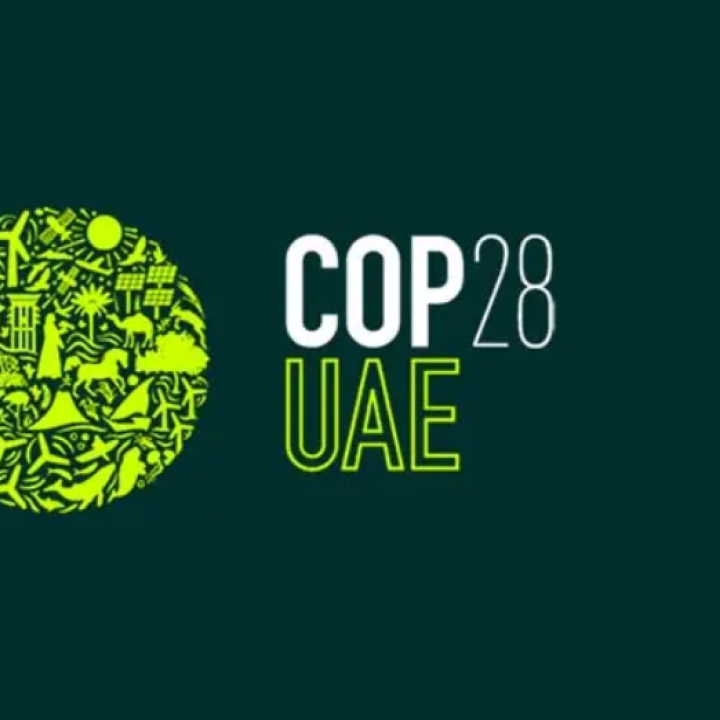
- Policy Analysis
- Policy Alert
Rising Temperatures at Dubai’s COP28 Meeting

The conference agenda extends well beyond climate issues, with implications for regional rivalries, U.S.-Emirati relations, and Israeli wartime diplomacy.
Earlier today, the latest international climate conference, COP28, kicked off in Dubai—a location that aptly reflects the event’s connection to both regional geopolitics (given Iran’s location just across the Persian Gulf) and energy transition issues (given that the United Arab Emirates holds 6 percent of the world’s oil reserves). For the next twelve days, attendees will discuss how to slow global warming and prevent potentially catastrophic effects worldwide, all at a time when many participating countries are dealing with energy supply disruptions emanating from the Ukraine war. Ironically, the conference’s opening day coincided with a virtual meeting of the OPEC+ oil cartel, where the UAE, Russia, and other member states discussed how to maintain high prices without decreasing demand. In the end, they decided to further cut oil production beginning in January.
On the eve of the conference, Emirati leader Sheikh Muhammad bin Zayed al-Nahyan declared that his country is “determined to unite the world around climate action.” Nearly 100,000 delegates are expected to attend, including everyone from Pope Francis to King Charles III to Israeli president Isaac Herzog (though the expected Israeli delegation of 1,000 has been pruned to just 28). Unsurprisingly, news of Herzog’s potential presence led Iranian president Ebrahim Raisi to declare that he will boycott the event.
So far, much attention has been focused on three issues: what ideas the UAE will offer for reducing global temperatures while simultaneously expanding oil production; the extent to which climate protesters will be able to hold rallies in Dubai; and the efficacy of last-minute diplomacy by the United States. Washington had originally planned for environmental envoy John Kerry to lead its delegation, with President Biden deciding not to go despite attending the previous two COP meetings in Scotland and Egypt. Earlier this week, Kerry explained the president’s absence by noting the administration’s preoccupation with other crises: “They’ve got the war in the Middle East and a war in Ukraine. A bunch of things going on.”
On November 29, however, CNN reported that Biden’s decision had met with “pushback” from the UAE. Speedy U.S. outreach was soon to follow—the White House announced that Vice President Kamala Harris would lead the U.S. delegation, even though her spokeswoman had previously said she had no plans to attend. Biden also reportedly held a phone call that day with Sheikh Zayed. According to the readout, they discussed both the Hamas-Israel war and their “strong bilateral ties”—a boilerplate phrase that brings to mind recent tensions related to the UAE’s ties with Russia and its apparent decision to let China build an intelligence base on Emirati soil. Additionally, the latest edition of the Economist noted that “the UAE is arming the Rapid Support Forces, a Sudanese militia that is committing genocide in Darfur.”
As for the UAE’s record on going green, the country’s ample oil exports do not technically count against it on the global environmental ledger—instead, the effects are filed against the countries that consume its oil. By that definition, the UAE plans to be net zero by 2045 and carbon neutral by 2050. As COP28 chair and national oil company chief Sultan al-Jaber recently told the Washington Post, “We are not shying away from the energy transition. In fact, we are running towards it.” On November 29, the Financial Times reported that Jaber had just visited fellow oil exporter Azerbaijan to inaugurate a 230-megawatt solar energy project and sign an estimated $1 billion in new agreements to quadruple the country’s solar capacity. Yet the visit may be viewed in a different light now that leaked documents indicate the UAE plans to hold private talks with fifteen countries during COP28 to develop oil and natural gas projects.
Will such talks be greeted by climate protests? The UAE is infamous for its intolerance toward mass public demonstrations, so the extent to which any dissent becomes visible will be watched closely. Journalists following up on the leaked documents story were met with the response “private talks are private talks,” signaling that public criticism is neither welcome nor permissible.
This attitude has also contributed to a recent free-speech controversy inside Britain, where an Emirati-led group led by Sheikh Zayed’s brother is trying to buy the Daily Telegraph newspaper and its associated political magazine, the Spectator. In a November 27 Times of London op-ed titled “UAE is admirable but must not own our media,” former foreign secretary William Hague argued that the Telegraph sale “would seriously compromise the paper’s ability to report freely and fairly.”
COP28 also holds implications for competition between members of the Gulf Cooperation Council, who are developing a keen sense of the benefits associated with hosting prestige international events. The UAE is a leader in this regard, having also hosted the most recent World Expo in 2021-22. Its rivals are not far behind, however—Qatar hosted the 2022 World Cup, while Saudi Arabia will host the 2034 tournament and the 2030 World Expo. Yet these seemingly innocuous diplomatic victories can conceal sharp edges. For instance, Saudi Arabia has reportedly told international corporations that they must locate their regional headquarters in Riyadh rather than the UAE. And Qatar’s status as a major exporter of gas (a greener fuel than oil) could up the economic ante of its often-tense diplomatic competition with major oil producers like the UAE and Saudi Arabia.
Judging the success or failure of COP28 will have to wait until the event finishes. Yet Washington can already glean some encouragement from the fact that the conference is still taking place amid the Gaza war—not to mention the Israeli president’s anticipated attendance alongside multiple Arab officials.
Simon Henderson is the Baker Fellow and director of the Bernstein Program on Gulf and Energy Policy at The Washington Institute.



